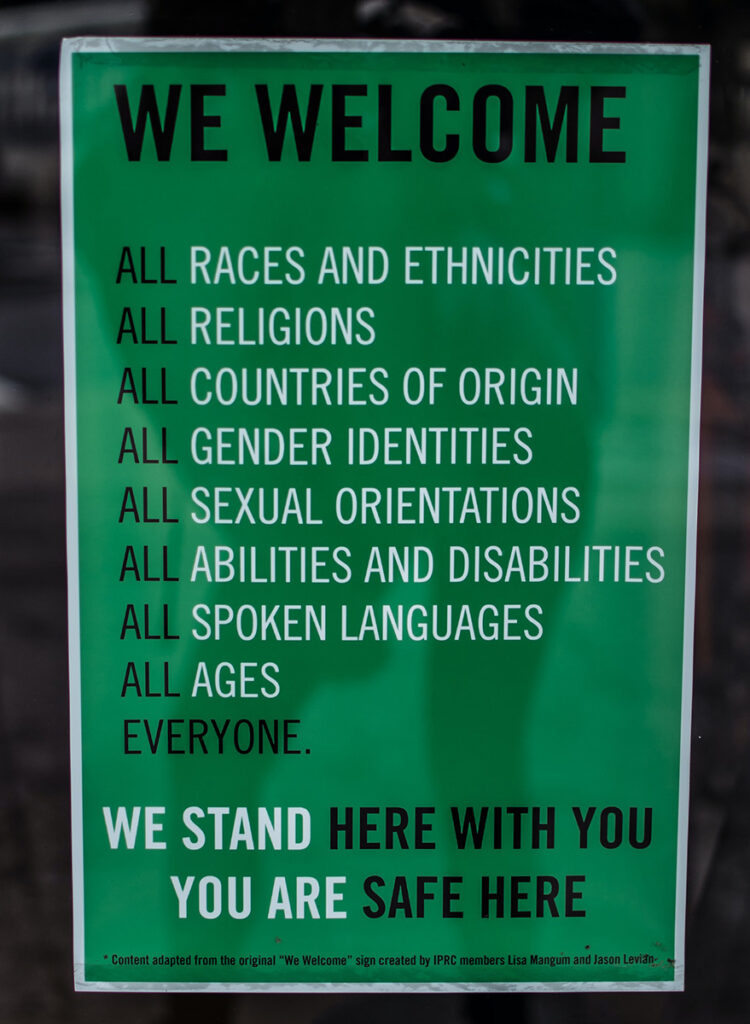It has now become commonplace for major corporations to join in on LGBT events such as Pride Month, National Coming Out Day or the International Day Against Homophobia, Transphobia and Biphobia. Indeed, this is sometimes a source of criticism within the community as companies are perceived to be cashing in on LGBT causes.
In the United States, several hundred American corporations are part of a Human Rights Campaign business coalition which advocates in support of a bill in Congress that would provide legal protections to LGBT people.
But it is easy to forget that these demonstrations of support for LGBT customers and employees is restricted to certain countries. Corporate solidarity is rarely a privilege afforded to people living in countries where governments are hostile to the LGBT community.

This represents a large proportion of the world. According to the International Lesbian and Gay Association, 69 countries currently criminalise consensual same-sex activities. In some countries, the penalty is death. For LGBT people in these hostile countries, including those who work at multinational corporations, coming out puts their lives in danger.
But multinational corporations that have a presence in hostile countries can use their economic influence and corporate resources to advance protections for LGBT people in the same way they champion equality in western countries.
Corporate social responsibility
Given the resources corporations invest in corporate political activity, they can help advocate for LGBT rights in hostile countries as part of their social responsibility agenda.
As multinational corporations contribute to the economy in their host countries, they have access to the government officials. Access creates an opportunity for them to raise concerns regarding a country’s unfriendly LGBT laws and practices.
Can multinational corporations really be fully engaging in social responsibility if they turn a blind eye to state-sanctioned hostilities against LGBT people, including their own employees, suppliers, and customers?
There will be critics who argue multinational corporations should respect the laws of their host countries and avoid activities that could negatively impact their business interests.
This position needs to be challenged. Can multinational corporations really be fully engaging in social responsibility if they turn a blind eye to state-sanctioned hostilities against LGBT people, including their own employees, suppliers, and customers?
Supporting LGBT people in hostile countries
Although corporations may feel obliged to comply with local laws that criminalise same-sex activities, there are varying degrees of action that can be taken to protect LGBT people in hostile countries.

One of the approaches suggested by Coqual, a global non-profit think tank, is the “Advocate Model” by which corporations directly lobby host governments or provide symbolic support for the local LGBT community.
This can be done either as part of ongoing engagements with lawmakers or on a one-off basis where protections for LGBT people are directly raised in business meetings. For multinational corporations that choose to directly advocate, the approach may need to be measured without being heavy-handed.
Depending on the country, securing full equality for LGBT people such as recognition for same-sex marriages may not be realistic at present, but efforts to provide fundamental protections such as decriminalisation, the introduction of laws against hate crime and non-discrimination policies for LGBT people may be more attainable.
LGBT talent takes into consideration a country’s laws when selecting international assignments and business travel.
Another approach to corporate LGBT advocacy is being part of a global coalition of like-minded businesses. Open For Business, a London-based non-profit, undertakes research on the economic benefits of LGBT inclusion.
One of its recent reports found that LGBT talent takes into consideration a country’s laws when selecting international assignments and business travel. Another demonstrated the negative economic impacts of hostile policies toward LGBT people in Central and Eastern Europe.
Corporations can use evidence like this to make the business case that unfriendly LGBT laws and practices could have an impact on the talent pipeline and by extension the local economy.
Beyond the “pink dollar”
A corporation that prides itself on being a good place to work for LGBT people and chases the “pink dollar” but takes little action to advocate against the persecution of those very people may risk justifiable criticism about its true commitment to the community.
There could also be reputational risks where multinational corporations have a significant presence in hostile countries with harsh laws while marketing themselves as LGBT-friendly businesses in western countries.
The reasons multinational corporations are doing more to advance LGBT equality at home may be tied to the growing workplace diversity and inclusion agenda, and the plentiful “pink dollar”. But they also need to examine the human impact of doing nothing to protect LGBT people – which of course include their own employees, suppliers, and customers in hostile countries – despite any potential business risks.
This article was originally published by The Conversation under the Creative Commons licence.
License and Republishing
The Choice - Republishing rules
We publish under a Creative Commons license with the following characteristics Attribution/Sharealike.
- You may not make any changes to the articles published on our site, except for dates, locations (according to the news, if necessary), and your editorial policy. The content must be reproduced and represented by the licensee as published by The Choice, without any cuts, additions, insertions, reductions, alterations or any other modifications.If changes are planned in the text, they must be made in agreement with the author before publication.
- Please make sure to cite the authors of the articles, ideally at the beginning of your republication.
- It is mandatory to cite The Choice and include a link to its homepage or the URL of thearticle. Insertion of The Choice’s logo is highly recommended.
- The sale of our articles in a separate way, in their entirety or in extracts, is not allowed , but you can publish them on pages including advertisements.
- Please request permission before republishing any of the images or pictures contained in our articles. Some of them are not available for republishing without authorization and payment. Please check the terms available in the image caption. However, it is possible to remove images or pictures used by The Choice or replace them with your own.
- Systematic and/or complete republication of the articles and content available on The Choice is prohibited.
- Republishing The Choice articles on a site whose access is entirely available by payment or by subscription is prohibited.
- For websites where access to digital content is restricted by a paywall, republication of The Choice articles, in their entirety, must be on the open access portion of those sites.
- The Choice reserves the right to enter into separate written agreements for the republication of its articles, under the non-exclusive Creative Commons licenses and with the permission of the authors. Please contact The Choice if you are interested at contact@the-choice.org.
Individual cases
Extracts: It is recommended that after republishing the first few lines or a paragraph of an article, you indicate "The entire article is available on ESCP’s media, The Choice" with a link to the article.
Citations: Citations of articles written by authors from The Choice should include a link to the URL of the authors’ article.
Translations: Translations may be considered modifications under The Choice's Creative Commons license, therefore these are not permitted without the approval of the article's author.
Modifications: Modifications are not permitted under the Creative Commons license of The Choice. However, authors may be contacted for authorization, prior to any publication, where a modification is planned. Without express consent, The Choice is not bound by any changes made to its content when republished.
Authorized connections / copyright assignment forms: Their use is not necessary as long as the republishing rules of this article are respected.
Print: The Choice articles can be republished according to the rules mentioned above, without the need to include the view counter and links in a printed version.
If you choose this option, please send an image of the republished article to The Choice team so that the author can review it.
Podcasts and videos: Videos and podcasts whose copyrights belong to The Choice are also under a Creative Commons license. Therefore, the same republishing rules apply to them.





